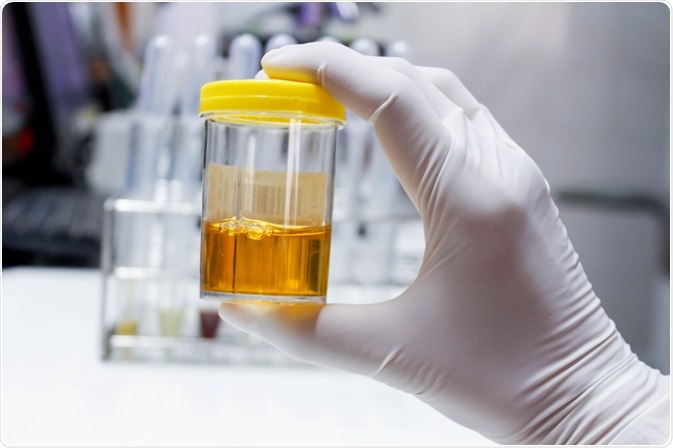A 24-hour urine collection test is a laboratory test to measure the content of certain substances in the urine, which can be used as a diagnostic indicator of the function of the kidneys.
The test involves the collection of all urine in several containers over a complete 24-hour period. It is important that the urine samples are kept in a cool environment until they are analyzed in a laboratory to ensure the results are unaltered.
 Image Credit: plenoy m / Shutterstock.com
Image Credit: plenoy m / Shutterstock.com
Purpose of the urine collection test
The 24-hour urine collection test can provide useful information about the concentration of protein, hormones, minerals and other chemicals in the urine. This can help in the diagnosis of kidney disease, which may be associated with various health conditions, including:
- Diabetic nephropathy
- Hypertension
- Lupus nephritis
- Recurrent urinary tract infections
- Blockage of the urinary tract
- Alport syndrome
- Nephrotic syndrome
- Polycystic kidney disease
- Interstitial nephritis
- Preeclampsia
Preparation for the urine collection test
There is no specific preparation needed, except for the provision of several large containers to collect and store the urine for the analysis. Access to a storage place to keep the urine out of heat that may confound the results should also be ensured.
It is important that patients understand what the 24-hour urine collection test involves and what they need to do to get the best results. In particular, they should try to maintain their regular daily routine and avoid excess of foods that may affect the sample, such as those containing caffeine.
During the urine collection test
The 24-hour period when the urine samples will be collected can begin at any time of the day. Many find it easiest to start first thing in the morning and collect samples over the next 24 hours.
There is no need to retain a sample from the first urination, but the time should be recorded, and it is important that all urine from that point is collected for the following 24 hours. The final sample can be taken exactly 24-hour after the first urination.
All urine samples within the sampling period should be saved and kept cool in a refrigerator until the test is complete and the sample can be sent to a laboratory for analysis.
What tests are done on a 24 hour urine sample? Why are they still necessary?
Results of the urine collection test
The urine is primarily made up of water and normally contains specific concentrations of dissolved chemicals such as:
- Sodium
- Potassium
- Urea
- Creatinine
When the concentrations of these substances are outside of the range considered to be normal, there may be an underlying health condition or disease that is causing the change. Additionally, excess concentration of protein in the urine can also be a presenting problem.
Abnormal results may be indicative of a health condition such as amyloidosis, preeclampsia, kidney disease, multiple myeloma or other cancers.
Challenges of the test
The 24-hour urine collection test is a simple and safe test and involves the normal process of urination, although all urine must be collected. Therefore, the test is not associated with any risks or complications.
However, there is the potential for the results of the test to be altered or inaccurate if the test is not carried out in an optimal manner. Common errors that may affect the results of the test may include:
- Forgetting to collect all urine within the 24-hour period
- Taking urine samples beyond the 24-hour period
- Spilling some of the urine samples
- Exposing the urine sample to heat
Additionally, the lifestyle activities undertaken during the testing period may affect the urine sample and the results of the test. Factors that affect the urine sample include stress, physical exertion and certain foods or drinks such as those containing caffeine.
References
Further Reading
Last Updated: Feb 10, 2021